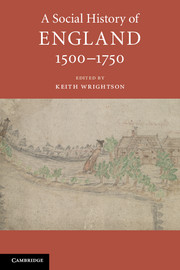Book contents
- Frontmatter
- Contents
- List of Figures
- List of Tables
- List of Contributors
- Acknowledgements
- List of Abbreviations
- Introduction: Framing Early Modern England
- PART I DISCOVERING THE ENGLISH
- 1 Crafting the Nation
- 2 Surveying the People
- 3 Little Commonwealths I: The Household and Family Relationships
- 4 Little Commonwealths II: Communities
- PART II CURRENTS OF CHANGE
- PART III SOCIAL IDENTITIES
- Coda: History, Time and Social Memory
- Further Reading
- Index
4 - Little Commonwealths II: Communities
from PART I - DISCOVERING THE ENGLISH
Published online by Cambridge University Press: 28 May 2018
- Frontmatter
- Contents
- List of Figures
- List of Tables
- List of Contributors
- Acknowledgements
- List of Abbreviations
- Introduction: Framing Early Modern England
- PART I DISCOVERING THE ENGLISH
- 1 Crafting the Nation
- 2 Surveying the People
- 3 Little Commonwealths I: The Household and Family Relationships
- 4 Little Commonwealths II: Communities
- PART II CURRENTS OF CHANGE
- PART III SOCIAL IDENTITIES
- Coda: History, Time and Social Memory
- Further Reading
- Index
Summary
Introduction
Everyone in early modern England belonged to a community. Membership entailed not just shared space but a social arrangement that organised lives, managed relationships, and shaped identities within lifespans and across generations. Communities were built on values, informing the collective evaluation of conduct to determine reputation and status. Yet ideals were honoured as much in the breach as the observance, especially at times of rapid change, which suggests why contemporaries worried about them so much. This chapter will explore both enduring and evolving characteristics of English communities, in terms of physical appearance and, less tangibly, how community was experienced – a more transcendent sense of attachment sustained by feeling and emotion.
Community was so fundamental to existence that contemporaries made little effort to define it. Unlike the household, the term conveyed only a vague sense of identity and engagement. In 1604 the schoolmaster Robert Cawdrey, drawing on the Roman concept of communitas, gave it simply as ‘fellowship’, offering ‘communion’ as a synonym. Throughout the seventeenth century, lexicographers elaborated on this without much deviation. One described ‘Fellowship in partaking together’, another ‘injoying in common or mutual participation’. The best definition that some dictionaries managed was ‘to commune’, derived from communicare, hinting that communities were arenas for making human connections. Communities, then, grew from dynamic social relations. The radical Robert Coster sought in 1649 ‘to advance the work of publick Community’ by challenging landed tyranny. Only by levelling its gentry and clergy, he argued, could England enjoy ‘Brave Community’. Thus ‘community’ had overtones of both ‘charity’ and ‘commonwealth’, fusing ideals of spiritual and economic unity. Hobbes conceived community in terms of ‘concord’ and ‘covenants’, which like ‘peace’ and ‘love’ struck him as vital pre-conditions for stable government. By this time, the secondary definition of ‘a Corporation or Company incorporate’ was emerging, shifting the meaning from ‘spiritual congregation’ to ‘political and commercial collective’. This is not to imply, however, that the habit of lay association was not already established in the Middle Ages, nor that the community's spiritual dimension had disappeared by the modern period.
Early modern social historians have made ‘the community’ a category of analysis, essential to understanding the intersecting currents of continuity and change that characterise their period.
- Type
- Chapter
- Information
- A Social History of England, 1500–1750 , pp. 84 - 104Publisher: Cambridge University PressPrint publication year: 2017
- 3
- Cited by



